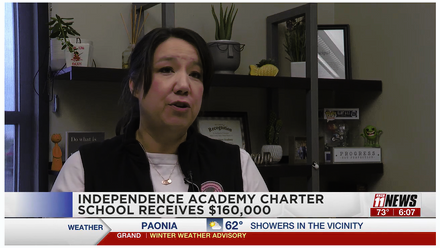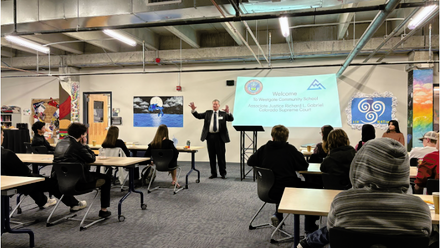For NRCCS, the Struggle for School Meals is Real
Nestled 17 miles outside of Steamboat Springs, North Routt Community Charter School (NRCCS) faces a unique and pressing challenge: securing reliable meal service for its students. Like many schools across rural areas, NRCCS is not part of the National School Lunch Program (NSLP) because its location makes finding a vendor – who must comply with NSLP requirements – challenging. As a result, students and families in these areas are missing out on both nutritional and economic benefits.
For ten years, this rural school in Routt County has depended on a single vendor to provide meals, a local general store who made cold sack lunches – though not as part of NSLP. With service soon discontinuing, NRCCS finds itself at a critical crossroads.
“We are going to lose our vendor who has provided school lunch to NRCCS for the past decade,” says Principal Daniel Kohler. “We have tried working with other restaurants close to school and even ran a pilot program for two weeks."
That restaurant opted out due to staffing concerns. NRCCS’ authorizer, Steamboat Springs School District, also declined to service the school due to staffing and delivery challenges.
“We reached out to numerous possible vendors and all have turned us down. We have even reached out to the local guest ranches to see if they are interested but they too have declined,” says Kohler.
Exploring Alternatives
NRCCS’ dilemma underscores the broader challenge that many rural schools face: distance and infrastructure constraints that make meal service solutions difficult to sustain. But in schools lacking a NSLP, a ripple effect begins. Students who qualify for free and reduced lunch miss the benefits of additional nutrition, and their families miss out on the extended economic benefits that accompany the national program.
Without a commercial kitchen or the necessary appliances to prepare meals on-site, NRCCS is left with few alternatives. Kohler and his team explored the possibility of renovating their existing kitchen, but a consultant’s evaluation revealed that extensive and costly upgrades are needed before the school could prepare meals in-house.
With in-house meal preparation currently off the table, the school continues to search for external vendors willing to take on the challenge of daily meal service.
The Financial Burden
Unlike schools that receive funding through the NSLP, even if NRCCS finds a new vendor, families must continue paying out of pocket for school meals. To alleviate the financial burden on families who would otherwise qualify for free and reduced lunch, the school secures grant funding through local organizations, including the United Way and the Yampa Valley Community Foundation.
However, while these grants help make meals more accessible, they do not solve the fundamental issue of finding a food vendor willing and able to supply meals consistently.
“We need a restaurant that can make the food for us on a daily basis,” reiterates Kohler.
Ilene Agustin, Director of School Nutrition, for the Colorado Charter School Institute, says that’s one option. If that isn’t feasible, the second option is to “find the money to purchase equipment to prepare the meals themselves, which will allow them more autonomy.”
Grants and funding opportunities remain a potential avenue for addressing infrastructure limitations. If NRCCS could secure financial support to upgrade its kitchen, it might be able to transition to an on-site meal preparation model in the future. However, such an endeavor would require significant investment and logistical planning. For now, NRCCS remains committed to finding a new solution to keep meals available for its students.
North Routt County Community School is one of twelve charter schools participating in the League's Rural School Food Project (RSFP). Funded by a grant from The Colorado Trust, the project strives to increase access to nutritious and affordable food at rural charter schools across the western slope and northern Colorado.






